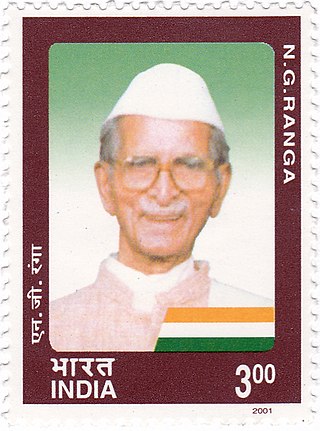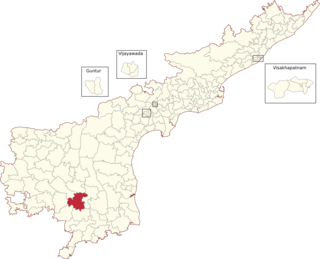
The All India Forward Bloc is a left-wing nationalist political party in India. It emerged as a faction within the Indian National Congress in 1939,led by Subhas Chandra Bose. The party re-established as an independent political party after the independence of India. It has its main stronghold in West Bengal. The party's current Secretary-General is G. Devarajan. Veteran Indian politicians Sarat Chandra Bose and Chitta Basu had been the stalwarts of the party in independent India.

Communist Party of India (Marxist–Leninist) New Democracy is a communist political party in India. The party was founded as a breakaway from the Communist Party of India (Marxist-Leninist) in 1988. The general secretary of this party is Yatendra Kumar.

Acharya Gogineni Ranga Nayukulu,also known as N. G. Ranga,was an Indian freedom fighter,classical liberal,parliamentarian and farmers' leader. He was the founding president of the Swatantra Party,and an exponent of the peasant philosophy. He received the Padma Vibhushan award for his contributions to the Peasant Movement. N.G. Ranga served in the Indian Parliament for six decades,from 1930 to 1991.

Puchalapalli Sundarayya(born Sundararami Reddy;1 May 1913 –19 May 1985),popularly known as Comrade PS,was an Indian Communist leader including of the peasant revolt in the former Hyderabad State of India,called the Telangana Rebellion and he was also one of the founding members of Communist Party of India (Marxist). He was so dedicated to the upliftment of the poor that he and his spouse chose not to have children,for the purpose of social service. He directly participated in Telangana armed struggle against the imperialism of the Nizam of Hyderabad. Sundarayya remained General Secretary of Communist Party of India (Marxist) until 1976.
The Bharatiya Kisan Sangh (BKS) is an Indian farmers' organization that is politically linked to the Rashtriya Swayamsevak Sangh. BKS was founded by Dattopant Thengadi in 1978. As of 2000,Rashtriya Swayamsevak Sangh claimed BKS had a quarter million members,organized in 11,000 villages and 301 districts across the country. The organization is dominated by landed gentry.
The Kisan Mazdoor Praja Party,or Praja Party for short,was a political party of India. Established in 1951,it merged with the Socialist Party to form the Praja Socialist Party in the following year. The Andhra unit of the party,however,revived the old party under the name "Praja Party" and lasted for a few more years.

The first legislative assembly Election to the Madras state based on universal adult suffrage was held in 27 March 1952. This was the first election held in Madras state after the Indian Independence. This election was officially known as the 1951 Madras State Election,even though through delays,actual voting didn't take place until early 1952.

Chittoor Assembly constituency is a constituency in Chittoor district of Andhra Pradesh that elects representatives to the Andhra Pradesh Legislative Assembly in India. It is one of the seven assembly segments of the Chittoor Lok Sabha constituency.

Kala Venkata Rao was an Indian independence activist and politician. He served as the Minister for Revenue in the governments of the Madras Presidency and Andhra Pradesh. He also served as the Minister of Finance in the latter.

The Tamil Nadu Legislative Assembly is the unicameral legislature of the Indian state of Tamil Nadu. It has a strength of 234 members,all of whom are democratically elected using the first-past-the-post system. The presiding officer of the Assembly is the Speaker. The term of the Assembly is five years,unless dissolved earlier.

Anakapalli Assembly constituency is a constituency in Anakapalli district of Andhra Pradesh that elects representatives to the Andhra Pradesh Legislative Assembly in India. It is one of the seven assembly segments of the Anakapalli Lok Sabha constituency.

Gudivada Assembly constituency is a constituency in Krishna district of Andhra Pradesh that elects representatives to the Andhra Pradesh Legislative Assembly in India. It is one of the seven assembly segments of the Machilipatnam Lok Sabha constituency.

Kaikalur Assembly constituency is a constituency in Eluru district of Andhra Pradesh that elects representatives to the Andhra Pradesh Legislative Assembly in India. It is one of the seven assembly segments of the Eluru Lok Sabha constituency.

Mangalagiri is a constituency in Guntur district of Andhra Pradesh that elects representatives to the Andhra Pradesh Legislative Assembly in India. It is one of the seven assembly segments of the Guntur Lok Sabha constituency.

Ponnur Assembly constituency is a constituency in Guntur district of Andhra Pradesh that elects representatives to the Andhra Pradesh Legislative Assembly in India. It is one of the seven assembly segments of the Guntur Lok Sabha constituency.

Tenali Assembly constituency is a constituency in Guntur district of Andhra Pradesh that elects representatives to the Andhra Pradesh Legislative Assembly in India. It is one of the seven assembly segments of the Guntur Lok Sabha constituency.

Vinukonda Assembly constituency is a constituency in Palnadu district of Andhra Pradesh that elects representatives to the Andhra Pradesh Legislative Assembly in India. It is one of the seven assembly segments of the Narasaraopet Lok Sabha constituency.

Rayachoti Assembly constituency is a constituency in Annamayya district of Andhra Pradesh that elects representatives to the Andhra Pradesh Legislative Assembly in India. It is one of the seven assembly segments of the Rajampet Lok Sabha constituency.

Amalapuram is a Scheduled Caste reserved constituency in Konaseema district of Andhra Pradesh that elects representatives to the Andhra Pradesh Legislative Assembly in India. It is one of the seven assembly segments of the Amalapuram Lok Sabha constituency.
Puttur Assembly constituency was an assembly constituency of the Madras Legislative Assembly till States Reorganisation Act,1956 Andhra Pradesh Legislative Assembly,India. It was one of constituencies in the Chittoor district.
















